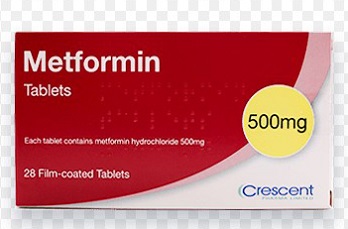Nikhil Prasad Fact checked by:Thailand Medical News Team May 19, 2024 1 year, 7 months, 2 weeks, 3 days, 5 hours, 33 minutes ago
Medical News: Metformin, a widely prescribed medication for type 2 diabetes, has been associated with numerous health benefits beyond its primary purpose of blood sugar control. Recent studies have begun to unveil its potential role in reducing the risk of various cancers, including blood cancers. This
Medical News report delves into the findings of a significant study led by researchers from Aalborg University Hospital-Denmark which investigated the relationship between metformin use and the risk of developing myeloproliferative neoplasms (MPNs), a group of blood cancers.
 Metformin Use Is Linked To Reduced Risk Of Developing
Metformin Use Is Linked To Reduced Risk Of Developing
Certain Blood Cancers
Understanding Myeloproliferative Neoplasms (MPNs)
Myeloproliferative neoplasms (MPNs) are a group of diseases characterized by the abnormal production of blood cells in the bone marrow. This overproduction can lead to several complications, including bleeding problems, increased risk of stroke or heart attack, and organ damage. MPNs include conditions such as essential thrombocythemia (ET), polycythemia vera (PV), and myelofibrosis (MF). These diseases are driven by mutations in specific genes, resulting in excessive proliferation of myeloid progenitors and abnormal blood cell counts.
The Anti-Inflammatory Effects of Metformin
Metformin is primarily known for its ability to improve insulin sensitivity and lower blood glucose levels. However, it also possesses anti-inflammatory properties, which have sparked interest in its potential protective effects against cancers. Inflammation plays a critical role in the development and progression of MPNs, making metformin a candidate for investigation in this context.
The Danish Study: Methodology and Findings
The Danish population-based case-control study aimed to explore the association between metformin use and the risk of MPNs. Researchers utilized Danish health registers to identify cases of MPN diagnosed between 2010 and 2018. These cases were compared to a control group from the general population, matched for age and sex. The study included 3,816 MPN cases and 19,080 controls.
Key Results
The study revealed that metformin use was associated with a significant reduction in the risk of developing MPNs. Specifically, 7.0% of MPN cases had used metformin, compared to 8.2% of the control group. The protective effect was even more pronounced with long-term use of metformin (≥5 years), where only 1.1% of MPN cases had used the drug compared to 2.0% of controls.
Dose-Response Relationship
A dose-response relationship was observed, indicating that the longer the duration of metformin use, the greater the protective effect. This finding is particularly relevant given that MPNs develop over a long period, and long-term use of metformin appears to offer substantial benefits in reducing the risk.
Mechanisms Behind Metformin's Protective Effects
The study hypothesize
d several mechanisms through which metformin could exert its protective effects against MPNs. Preclinical studies have shown that metformin can activate the AMPK-mTOR pathway, downregulate JAK2/STAT signaling, and affect mitochondrial activity. These pathways are crucial in the pathogenesis of myeloid neoplasms, suggesting that metformin's antineoplastic properties may extend to blood cancers.
Anti-Inflammatory Properties
Given that MPNs are highly inflammatory diseases, metformin's anti-inflammatory effects could also play a significant role. By reducing inflammation, metformin may help prevent the abnormal proliferation of blood cells that characterizes MPNs.
Limitations of the Study
While the findings are promising, the study had several limitations. Its retrospective design means that causality cannot be firmly established. Additionally, lifestyle factors such as smoking, obesity, and dietary habits, which can influence cancer risk, were not fully accounted for. The researchers acknowledged these limitations and called for further prospective studies to confirm their findings.
Broader Implications of Metformin Use
Previous studies have linked metformin use to a reduced risk of various other cancers, including gastrointestinal, breast, and urologic cancers. A meta-analysis of these studies supported the notion that metformin has broad antineoplastic properties, potentially offering protection against a wide range of malignancies.
Potential for Drug Repurposing
The findings from the Danish study contribute to the growing body of evidence supporting the repurposing of metformin for cancer prevention and treatment. Given its safety profile, widespread use, and affordability, metformin could become a valuable tool in oncology, particularly for preventing cancers in high-risk populations.
Future Research Directions
The researchers expressed hope that additional studies would be conducted to further explore metformin's protective effects against other hematological neoplasms, such as myelodysplastic syndromes and acute myeloid leukemia. Identifying similar trends in these conditions could reinforce the potential of metformin as a cancer-preventive agent.
Conclusion
The Danish population-based study provides compelling evidence that metformin use is associated with a reduced risk of developing myeloproliferative neoplasms. The observed dose-response relationship, with more extended use offering greater protection, underscores the potential benefits of long-term metformin therapy. While further research is needed to confirm these findings and understand the underlying mechanisms, this study adds to the growing body of literature suggesting that metformin may play a valuable role in cancer prevention. As we continue to explore the full potential of this widely used diabetes medication, its impact on public health could be profound, offering new avenues for the prevention and treatment of cancer.
The study findings were published in the peer reviewed journal: Blood Advances.
https://ashpublications.org/bloodadvances/article/doi/10.1182/bloodadvances.2023012266/516127/Metformin-use-and-risk-of-myeloproliferative
For the latest on Metformin, keep on logging to Thailand
Medical News.
Read Also:
https://www.thailandmedical.news/news/metformin-s-impact-on-immune-response-genes-and-gut-microbiota-in-covid-19-patients-with-type-2-diabetes
https://www.thailandmedical.news/news/covid-19-news-weill-cornell-study-finds-that-sars-cov-2-infects-and-triggers-senescence-of-dopamine-neurons-metformin-helps
https://www.thailandmedical.news/news/cancer-news-austrian-study-finds-that-metformin-might-be-useful-for-treatment-of-metastatic-prostate-cancer
https://www.thailandmedical.news/news/drug-news-metformin-the-wonder-drug-now-shown-to-be-able-to-prevent-muscle-atrophy-and-muscular-fibrosis-in-a-randomized-clinical-trial
https://www.thailandmedical.news/news/breaking-u-s-randomized-clinical-trial-findings-published-in-lancet-shows-that-metformin-reduces-risk-of-developing-long-covid-by-40-percent
https://www.thailandmedical.news/news/breaking-news-metformin-shows-remarkable-results-in-reducing-sars-cov-2-viral-loads-in-phase-3-randomized-clinical-trial-conducted-in-america
https://www.thailandmedical.news/news/metformin-and-leucine:-a-novel-anti-aging-tool-combating-muscle-atrophy-and-cellular-senescence
https://www.thailandmedical.news/news/med-news-stanford-study-find-metformin-use-is-associated-with-lower-incidence-of-osteoarthritis
https://www.thailandmedical.news/news/long-covid-news-university-of-minnesota-study-shows-that-early-use-of-metformin-during-sars-cov-2-infection-can-prevent-long-covid
https://www.thailandmedical.news/news/yet-another-study,-this-time-led-by-scientists-from-the-university-of-minnesota-shows-that-metformin-decreases-risk-of-covid-19-severity
https://www.thailandmedical.news/news/cleveland-clinic-and-northwestern-university-study-shows-that-metformin-could-be-repurposed-to-treat-atrial-fibrillation-findings-relevant-in-covid-se
https://www.thailandmedical.news/news/spanish-study-shows-that-metformin-glucophage-lowers-risk-of-disease-severity-and-fatal-outcomes-in-diabetic-patients-infected-with-covid-19
https://www.thailandmedical.news/news/university-of-minnesota-led-phase-three-randomized-clinical-trial-shows-that-metformin-reduces-risk-of-covid-19-disease-severity-and-mortality-
https://www.thailandmedical.news/news/covid-19-drugs-university-of-alabama-study-shows-that-metformin-decreases-mortality-rate-in-type-2-diabetes-patients-contracting-covid-19
https://www.thailandmedical.news/news/diabetic-patients-taking-sglt2-inhibitors-may-develop-complications-upon-contracting-covid-19-warns-researchers-metformin-is-a-better-option
https://www.thailandmedical.news/news/latest-medical-news-reports-that-metformin-can-drastically-reduce-covid-19-mortality-risks-in-women
https://www.thailandmedical.news/news/breaking-metformin-might-emerge-as-another-covid-19-drug-candidate-with-university-of-minnesota-now-receiving-funding-for-further-research
https://www.thailandmedical.news/news/metformin-university-of-minnesota-researchers-discover-that-metformin-may-lower-risk-of-covid-19-deaths-in-obese-and-or-diabetic-women
https://www.thailandmedical.news/news/molecular-mechanisms-of-the-wonder-drug-:-metformin
https://www.thailandmedical.news/news/new-study-shows-that-metformin-may-prevent-ovarian-cancer
https://www.thailandmedical.news/news/study-shows-metformin-helps-in-certain-types-of-breast-cancer
https://www.thailandmedical.news/news/metformin-emerging-as-new-treatment-for-fibromyalgia-as-study-links-insulin-resistance-as-the-cause
https://www.thailandmedical.news/news/study-shows-metformin-help-patients-maintain-weight-loss-long-term
https://www.thailandmedical.news/news/drug-combo-of-metformin-and-syrosingopine-has-potential-in-future-cancer-therapy
https://www.thailandmedical.news/news/metformin-new-possibility-to-reverse-lung-fibrosis
